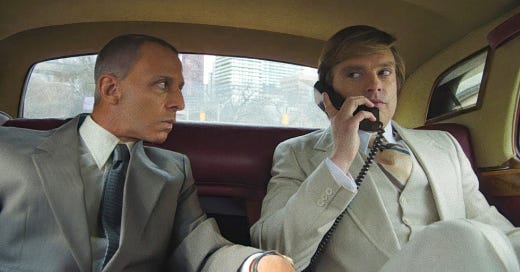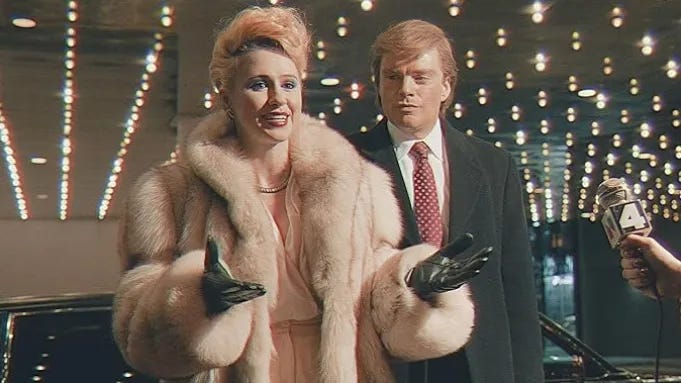Ali Abbasi's The Apprentice shows us how the sausage is made. It's an inside look into the pivotal and transformative years of one of the most controversial and reviled political figures of the 21st century, Donald J. Trump. The title 'The Apprentice' is a nod to Trump's early years as a real estate investor, where he was learning the ropes and being mentored by the infamous Roy Cohn. Abbasi makes this into a Frankenstein story by having Cohn be the critical cultivator of this monster, planting the seeds of power by any means necessary into a young Donald, and we see how Cohn loses control of the beast. The film's approach may raise questions about its banality. If you hate Trump, you probably won't learn or change much, and if you love the guy, I don't see you spending or engaging much time with this feature. However, the film is backed by two phenomenal performances by Sebastian Stan and Jeremy Strong, who are giving everything in this one. You can genuinely tell they have a lot of passion behind this. The film is shot wonderfully, and the directing keeps things fresh and personal, as if you were a fly on the wall for many of these psychotic conversations. The cinematography is so immersive that you feel part of these scenes. I don't think this is a great movie, and its second half felt very surface as to the movie's motivations, but I believe there is a lot to chew on, if not just for the great two lead performances. Let's talk about how Trump became Trump.
The film follows a young real-estate investor, Donald J. Trump (Sebastian Stan), in the 70s as he is trying to move himself up the social hierarchy in New York. He is then confronted and seduced by the devil, Roy Cohn (Jeremy Strong). Cohn is a hotshot lawyer who takes an interest in young Trump and takes him under his wing. We see how Trump is further corrupted by Cohn and slowly loses more of his soul, if he even has one. We cut to the 80s after years of influence by Cohn, and we see the quest for power and the bigger-than-life Trump persona start to take form where that starts affecting every aspect of his life, from phony business deals, relationships collapsing, and his obsession with his body image and health. Cohn slowly comes to grips with the fact that he has created a terror of a runaway train, and there's no stopping him from unleashing his torment upon the world.
The performances are genuinely out of this world. Sebastian Stan is not making some SNL Alec Baldwin-type impression of Trump that we've all come to know in the public eye, at least at first. The 70s young Trump version he's doing is more naturalistic and subtle. You can still see the eagerness in his eyes and a bit of sentimentality, as though there is a person in there. We gradually see him become the insane caricature we know him today, but it only works or is earned because of everything Jeremy Strong does in the first half of the film. Strong is thrilling and anxiety-inducing, just like Roy Cohn. He dominates every scene with his quirks and tics, and you can see how such an influential figure would seduce someone through this performance. I think the film is at its best, especially in the first half, when Strong is teaching Stan his rules and lessons of life and being fully rotted to the core with horrible tenants of capitalism and conservatism. I was fully locked into these scenes, and I think the film's first half felt right out of Scorsese's Mean Streets. Seeing the filthy and dangerous New York of the 70s and the corrupted underbelly of the city was so engaging. I can't help but be obsessed with the look and allowing so much fantastic hand-held camera feel and zooms into the inner workings of these larger-than-life figures that helped to ground it.
The Apprentice fell off for me in the second half as it fell victim to typical biopic tropes and played a lot of the greatest hits of Trump's life. It could all be purposeful, being a satire of the 80s glam and the fake Reagan-era promise of prosperity, but it never worked for me. We see him raise Trump Tower, his involvement in Atlantic City Casinos, his political desires, and where he starts to push himself away from his friends and family and focus on being a powerful con man. His political desires, driven by his quest for power, started to overshadow his relationships and business dealings. It just all felt very uninteresting to me. The film's critics calling out the banality of it all would point directly to this second half and say that we never truly dive into the psyche of one of the most critical and despicable men in history. I found the revelations made by Strong's character, like "What have I done?" to be at least a bit more impactful and made me empathetic to an objectively awful person in real life, which is a real feat—the family dynamics of why Trump is who he is all landed flat outside his brother. The love between him and Ivana didn't jump off the screen for me. The film is also a good litmus test for audiences to find the split between empathy and sympathy. I didn't find The Apprentice ever sympathetic to Cohn or Trump, but more understanding of the men and the genuine pain they faced in their lives. The film shows that Trump always had ill intentions, but Cohn was the kindling who set the whole thing ablaze. The sympathy is reserved for the family members and citizens who have suffered great ordeals by these two, which I wish politically they focused on more in the second half of the film.
The Apprentice is saved by its performance. I loved both the two leads and how they invoked the energy and personalities of the figures instead of shotty impressions that would have killed the whole thing. The framing device of a man losing control of the monster he's created is very cool, but I think the film's second half can be seen as almost a parody of Trump's 80s life, which is unfortunate. Ali Abbasi's film didn't cut deep enough for me, but I couldn't help but be surprised by how much I liked it and its intentions. I hope you enjoy seeing how the sausage was made or how Trump became orange.
Final Score: 7/10
Written by Kevin J. Pettit









Fantastic write-up. Felt the same way. The performances are notable. Maybe career-bests for both actors. Otherwise, the jump in the second half and the way it wraps up are pretty run of the mill 2010s biopic style.